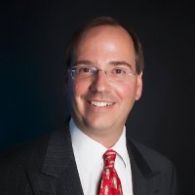Other Seminars
Seminars with a Broadcast Link or that say View Presentation or Download MP4 are available for viewing after the seminar. Presentations that say Broadcast Link or View Presentation have been recorded by OIT and are part of the CURENT online catalog found here. Presentations that say Download MP4 were recorded by us with ZOOM or WebEx.
![]()
June 17, 2019 - Dr. Vyto Babrauskas, Fire and Science Technology, Inc
Dr. Vyto Babrauskas will present a special seminar entitled "Powerlines and Wildfires: Cause or Victim?" in MHK 124 on Monday, June 17, 2019 from 9:30 am to 11:00 am. This seminar can be seen in person, through webcast or through WebEx (Webcast and Webex info is toward bottom of this email).
Title: Powerlines and Wildfires: Cause or Victim?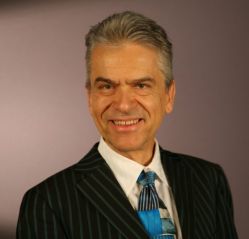
Abstract: The country is crisscrossed with transmission and distribution powerlines, and these commonly traverse over areas of vegetation. Under suitable weather conditions, vegetation is susceptible to being ignited from a wide variety of sources of heat or energy. When a wildland fire occurs and there are powerlines in the vicinity, it becomes appropriate to consider if the powerline might have been the cause of ignition for this fire. Conversely, a serious wildfire can be highly destructive to electrical utility equipment, thus powerlines can also be victims of wildfires. Since the responsibility assigned will be different depending on whether a line is a cause or a victim, it is important to properly evaluate the evidence and endeavor to reach correct conclusions.
Dr. Babrauskas has been preparing a massive new book, Electrical Fires and Explosions. In that endeavor, he has had to examine critically the available research that can be useful to assess the cause/victim status of a particular line. This seminar will examine the details pertinent to both possibilities and will offer some suggestions that may be helpful in properly understanding a wildfire incident that involves powerlines.
Bio: Dr. Vyto Babrauskas was a long-time researcher at The National Institute of Standards and Technology (NIST) where he developed the two primary tools for measuring heat release rate of fires—the Cone Calorimeter and the large-scale furniture calorimeter. He was awarded the first-ever Ph.D. degree in fire protection engineering, from the University of California, Berkeley, he also holds degrees in Physics and Structural Engineering. He is the author of over 350 articles and reports and three reference books: Heat Release in Fires, Fire Behavior of Upholstered Furniture and Mattresses, and the Ignition Handbook, which is the standard science reference work for fire investigators. Currently, he is finalizing the preparation of his latest book Electrical Fires and Explosions.
In 2005, the became the first-ever consultant that ASTM formally retained to assist in the process
ASTM standards from the research findings on the fire and collapse of the World Trade Center. Dr. Babrauskas served as editor for three editions (2003, 2007, and 2014) of Fire Science Applications to Fire Investigations. This is the only extensive collection of research papers on the topics of fire investigation and forensic applications of fire science.
During 2016 – 2019, he was a Visiting Scholar at the Dept. of Mechanical & Aerospace Engineering, University of California, San Diego (UCSD), in the combustion research group of Prof. Forman Williams.
In 2019, he was appointed as a Fellow at The Christian Regenhard Center for Emergency Response Studies at the John Jay College of Criminal Justice, City University of New York.
JOIN WEBEX MEETING
Meeting number (access code): 629 180 972
Host key: 421122
Meeting password: power
JOIN FROM A VIDEO SYSTEM OR APPLICATION
Dial sip:629180972@power-eecs.webex.com
You can also dial 173.243.2.68 and enter your meeting number.
JOIN BY PHONE
1-650-479-3208 Call-in toll number (US/Canada) Tap here to call (mobile phones only, hosts not supported): tel:1-650-479-3208
Global call-in numbers.
Can't join the meeting? Contact support here.
![]()
March 26, 2019 - Dr. Stephanie Bohon, University of Tennessee
Dr. Stephanie Bohon, University of Tennessee, will present about the culture of inclusion on March 26th Tuesday at 12:15 pm in 124 and 121. All CURENT faculty, staff and students are required to attend. Partner schools may view this presentation remotely through the webcast.
CURENT Inclusion Seminar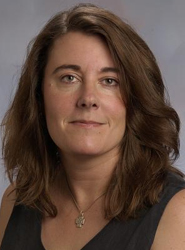
Presenter: Dr. Stephanie Bohon, University of Tennessee, Department of Sociology
Time: Tuesday, March 26, 12:30 PM - 1:30 PM EST
Location: Min H. Kao Building, Room 124 and 121 A&B
Title: The Science of Diversity: The Benefits of Inclusion for Your Research Career
Abstract: We often hear college and universities administrators urging us to work toward creating a diverse research and teaching environment, but we are rarely told why diversity matters. As a consequence, too many people view diversity as a bureaucratic box to check instead of approaching it for what it is--a means to create better science. In this talk, Dr. Bohon will discuss how diversity benefits researchers. Additionally, she will address the barriers to achieving diversity in STEM professions and the ways in which we may be limiting diversity without even realizing it.
Bio: Dr. Stephanie Bohon is Director of Graduate Studies in the Department of Sociology and founder of the Center for the Study of Social Justice. She holds degrees in economics, political science, and sociology, and a doctorate in demography from Penn State. Her research focuses on the impact of place on marginalized people, and she frequently examines how place characteristics are associated with racial inequality in education. She is the author of Latinos in Ethnic Enclaves: Immigrant Workers and the Competition for Jobs and Immigration and Population as well as two forthcoming books and several research articles.
Dr. Bohon has received numerous teaching and research awards including the M. G. Michael Award for innovative research, the Southern Program Excellence through Research award for the application of research to public policy, and the Martin Levin Award from the Southern Sociological Society. Her work has been reported by several national and international media including Time Magazine, National Public Radio, BBC-London, The New York Times, The Boston Globe, The Chicago Sun-Times, and USA Today.
In addition to serving as President of the Southern Demographic Association, Dr. Bohon has served as the Executive Officer for the Southern Sociological Society and on the board of the American Sociological Association. She edited Population Research and Policy Review from 2012-2015, and she currently serves on the editorial board of Organizational Research Methods, Population Research and Policy Review, and Social Currents.
![]()
Monday, July 23, 2018 - Dr. Harold Kirkham, PNNL
Dr. Harold Kirkham will give a seminar on Monday, July 23rd, 2018 at 2:00 pm EST in MHK 124.
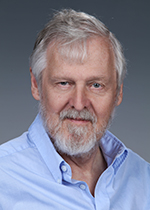
Title: Reactive Power: the shocking truth revealed!
Abstract: Power engineers are taught about reactive power early in their studies. If they want to know how to measure it, they might turn to IEEE Standard 1459. But there are several problems with what they learn, and the IEEE Standard actually enshrines a serious error. This talk reviews the history of reactive power, and examines the topic of reactive power from the viewpoint of measurement theory. The biggest problem stems from the fact that the measurement is of a kind (operationalist) that most engineers—even many metrologists—are not aware of. The result of a reactive power measurement may not even be close to having the meaning that is imagined.
Bio: Harold Kirkham obtained his BSc and MSc in the UK, and his PhD at Drexel University in Philadelphia. His interests are broad, and have always included both power systems and measurements.
Dr. Kirkham has worked at American Electric Power and at NASA’s Jet Propulsion Laboratory. At JPL he worked mainly on power projects, but he also played a (minor) role in the success of the Mars Rover now known as Curiosity. He ended his time at JPL as a Principal in the Reliability Engineering Office. In 2009 he moved to the Pacific Northwest National Laboratory, where he works mainly on phasor measurement units and is investigating measurement fundamentals.
He is a Fellow of IEEE, an IEEE Distinguished Lecturer, a member of the Power and Energy Society, the Instrumentation and Measurement Society, and several others. He was chair of the PES Instrumentation and Measurement Committee for several years, and has served on various other committees, as well as the Technical Council.
![]()
Thursday, July 19, 2018 - Dr. Marissa E. Morales-Rodriguez, ORNL
Dr. Marissa E. Morales-Rodriguez will give a seminar on Thursday, July 19th, 2018 at 2:00 pm EST.
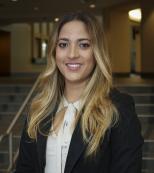
Title: Multiparameter Outstation Agents Sensor Suite for Cyber-Physical Security of the Electrical Grid Security
Abstract: The nation’s electrical system consists of both legacy and next generation technologies. With devices that may be 50 years old combined, in addition to the continuous penetration of Distributed Energy Resources and Internet of Things technologies, securing the Nation’s energy infrastructure from natural disasters as well as cyber-attacks is a big challenge. ORNL has developed a multiparameter outstation sensor suite for the remote monitoring of the electrical system. The sensor suite includes the monitoring of physical parameters related to the extended grid state, as well as built in cyber resilient features for sensors communication authentication using Ethereum based blockchain. During an event that could disrupt the energy delivery, the multiparameter outstation sensor suite can provide real time information on the health of the system.
Bio: Marissa E. Morales-Rodríguez (M’16) was born in San Juan, Puerto Rico. She received B.S. and M.S. degrees from the Department of Chemistry of the University of Puerto Rico at Mayagüez, and Ph.D degree in energy science and engineering with entrepreneurship track from the Bredesen Center for interdisciplinary Research and Graduate Education at the University of Tennessee Knoxville. Morales-Rodríguez is a R&D scientist with 8+ years of experience working on multidisciplinary teams of scientists and engineers to develop new sensing techniques with applications in the energy industry, environmental monitoring and homeland security. Her research focus is in the integration of additive manufacturing to develop low cost cyber sensors for energy delivery systems, technology development and commercialization. She is the author/coauthor of over 10 publications and 1 patent.
![]()
Friday, January 20, 2017 - Dr. Leon Tolbert, University of Tennessee
Dr. Leon Tolbert presented a seminar on Friday, January 20, 2017 at Min H. Kao, Room 525 from 12:20pm to 1:10pm EST. 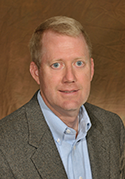
Title: Writing an Effective IEEE Paper
Abstract: This presentation will provide several tips on writing papers for IEEE conferences and transactions. It provides useful information on paper content, writing style, figures, formatting, and references that will improve chances of papers being accepted. The talk will also provide tips on proofreading papers and some of the requirements by the IEEE Power and Energy Society and IEEE Power Electronics Society.
Biography: Dr. Tolbert is a Thrust Leader in CURENT and the Min H. Kao Professor and Head in UT's Department of Electrical Engineering & Computer Science. Dr. Tolbert is also an adjunct participant at the Oak Ridge National Laboratory and conducts joint research at the National Transportation Research Center (NTRC). He is a Registered Professional Engineer in the state of Tennessee and an IEEE Fellow. He received his B.S. in Electrical Engineering with highest honors in 1989, followed by his M.S. and Ph.D. in Electrical Engineering in 1991 and 1999, all from the Georgia Institute of Technology. He was appointed as an assistant professor in the Department of Electrical and Computer Engineering at the University of Tennessee, Knoxville in 1999. He is also a participating faculty member of the Graduate Automotive Technology Education (GATE) Center at UT. Dr. Tolbert’s areas of research interest include high efficiency electric power conversion for data centers, application of WBG (SiC and GaN) power devices, multilevel converters, electric vehicles, renewable energy interfaces, and utility application of power electronics.
![]()
Friday, December 2, 2016 - Dr. Robert Broadwater, Virginia Tech
Dr. Robert Broadwater presented a seminar on Friday, December 2, 2016 at Min H. Kao, Room 404 from 12:20pm to 1:10pm EST.
Title: In Pursuit of Realistic, Reusable, Collaborative, Electric Grid Models
Abstract: Results from a recently sponsored DOE survey on the benefits and challenges of using holistic power system models (i.e., Transmission/Substation/Primary Distribution/Secondary Distribution) will be presented. A number of models that represent realistic power system construction, but which collectively pose challenges to current power flow technology, will be reviewed. Fundamental concepts of a new approach to system analysis, Graph Trace Analysis (GTA), will be presented. The application of GTA to holistic power system analysis will be discussed.
Biography: Robert Broadwater is a professor at Virginia Tech and serves as CTO for EDD. He designed the Distribution Engineering Workstation for the Electric Power Research Institute. He developed real-time, power plant simulations for Babcock & Wilcox and the Tennessee Valley Authority. He holds software patents related to electric power plant controls, and has experience working on nuclear, fossil, and hydro plants. A reconfiguration for restoration algorithm conceived by him was used to prevent a large power outage in St. Louis. He developed the Discrete Ascent Optimal Programming algorithm for solving large, constrained systems. He has developed an approach to system analysis, based on the Computer Science generic programming paradigm, referred to as Graph Trace Analysis. GTA based power flow algorithms can solve large T&D problems without using matrices. GTA has been used by his PhD graduate students to solve power flow problems on models containing several million objects, and to solve multi-domain engineering problems. GTA algorithms naturally distribute to multiple processors. He has published chapters in several engineering handbooks and has directed over 40 PhD students. Software that he has helped develop is used by electric utilities, universities, and national labs in the United States, South America, the Middle East, and Asia.
![]()
Friday, November 4, 2016 - Dr. John Lesko, Virginia Tech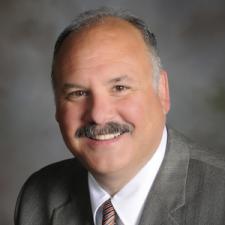
Dr. John Lesko will present a seminar on Friday, November 4, 2016 at Min H. Kao, Room 124 from 12:20pm to 1:10pm EST.
Broadcast Link: Click here
Topic: Dr. Lesko will describe the NSF Innovation-Corp process and how it can effectively be integrated into Engineering Research Center Technology transfer programs.
Title: Integrating I-Corps Lean LaunchPad Principles into ERC Technology Transfer Opportunities
Abstract: The National Science Foundation has invested in the development of training and a network supporting the promotion of Lean LaunchPad thinking for the academic community. Nearly 900 teams have now gone through the National training as I-Corps teams in nearly the last 5 years. The process engages faculty, graduate students and postdocs in a 7 week process where they use customer discovery principles seeking to identify product-market fit for a minimum viable product that can position a repeatable and scalable business model for a technology developed out of their laboratories. The DC I-Corps Regional Node (one of 7 teaching nodes across the US) has experimented with other versions of the training to address various business model and potential product generation opportunities with good success. Thus, this talk will provide a perspective on how an ERC might integrate the core principles of Lean LaunchPad into the innovation ecosystem with an aim to help with the translation of the center discoveries to the market place.
Biography: Dr. John “Jack” Lesko is a Professor of Engineering Mechanics at Virginia Tech and currently serving at the Associate Dean for Research & Graduate Studies. Jack has 25+ years of design and analytical experience as a mechanical engineer, with background in physics, mechanics and system analysis. His work has resulted in the implementation of in-service structures/systems using new multifunctional composite technologies and systems, and the creation of standards for their design in industrial and international codes.
Jack is the co-founder of PowerHub Systems, a start up in the Virginia Tech Corporate Research Center. PowerHub Systems develops, designs, and manufactures stationary battery electric storage and power processing systems for electric utility distribution systems. Through this startup experience, Jack has initiated problem based learning pilot programs enabled through interdisciplinary experiences in engineering education and entrepreneurial training. Jack is a Co-PI for the NSF I-Corps Mid Atlantic Regional Node (DC I-Corps) and is an instructor for both the National and Regional training programs guiding technical professionals through the Lean LaunchPad approach. Additionally, Jack serves on the Executive Committee of the GEM National Consortium, and on the Board of Directors of the Commonwealth Center Advanced Manufacturing (CCAM).
![]()
Thursday, April 28, 2016 - Dr. Alfonso Tarditi, ORNL
Dr. Alfonso Tarditi will present a seminar on Thursday, April 28, 2016 at Min H. Kao, Room 124 from 4:00pm to 5:00pm.
Title: Electromagnetic Environmental Effects for the Power Grid
Abstract: The electric power grid is going through a rapid technology transition characterized by a closer integration of power and control electronics, data processing, and telecommunication technologies. This process is leading to an increasingly complex electromagnetic environment that is associated, in general, with a higher power grid vulnerability to electromagnetic disturbances. This talk will introduce the Electromagnetic Environmental Effects (E3) discipline, that includes and extends the area of electromagnetic compatibility, discussing technologies and methods that are particularly relevant for the electric power industry. In this context, selected research directions that may answer some longer term industry challenges for nuclear generation will be also presented.
Biography: Dr. Tarditi completed his academic education at the University of Genoa, in Genoa, Italy (B.S. and M.S. degree in Electronics Engineering, Doctorate in Electrical Engineering). He was then awarded a N.A.T.O. fellowship for a post-doctoral appointment at the University of California at Berkeley, in the Electrical Engineering and Computer Science department. Dr. Tarditi conducted research in support of the US Dept. of Energy fusion program, first at the Lawrence Livermore National Laboratory (Livermore, CA) and at Science Application International Corporation (SAIC, San Diego, CA), involved in modeling and simulation, and high-performance computing. He then worked at the NASA Johnson Space Center (Houston, TX), in the Shuttle, Constellation, and International Space Station programs, focused on both hardware and software R&D in plasma propulsion, electromagnetic compatibility, and space power systems. During that time Dr. Tarditi also developed academic liaisons at University of Houston - Clear Lake (Houston, TX), as Adjunct Professor, and then Research Assistant Professor, in the Physics Department. Dr. Tarditi then served as a project manager at the Electric Power Research Institute (Knoxville TN), in the Power Delivery and Utilization sector, and as Chief Scientist at NPL Associates Inc. (Urbana, IL), a small firm focused in plasma and nuclear technologies. More recently, Dr. Tarditi joined the Senior R&D staff at the Oak Ridge National Laboratory, in the Electrical and Electronics Systems Research Division.
![]()
April 1, 2016 - Women Engineers in Leadership
Join us for a panel discussion about the challenges of the engineering profession
with three of its most successful women - Jacinda Woodward, Kim Greene and Jenifer Cistola.
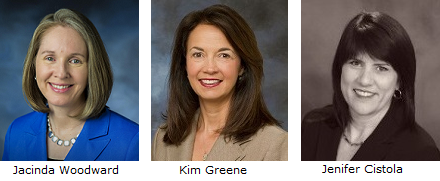
Title: Women Engineers in Leadership
Presenters: Jacinda Woodward, Kim Greene and Jenifer Cistola
Time: Friday, April 1st, 1:30 PM - 2:30 PM EST
Location: Min Kao Building, Room 622
Webinar info:https://sf.ites.utk.edu/utk/Login/Register?ReturnUrl=%2Futk%2FPlay%2Fe3e6de7954814be6b8b5fa5ee09507e01d
Biographies
Jacinda B. Woodward, PE, is Senior Vice President, Transmission & Power Supply Tennessee Valley Authority (TVA). Woodward joined TVA in 1984 and has worked in various nuclear, information technology and power transmission divisions throughout her career.
Woodward is currently Senior Vice President of Transmission & Power Supply. This business unit is responsible for the planning, design, construction, maintenance and real-time operation of TVA’s transmission system—one of the largest systems in the country. This business unit also has responsibility for TVA’s generation unit commitment and dispatch, power trading and power acquisition as well as reliability coordination services for seven electric utilities in parts of eleven states.
Prior to her current assignment, Woodward was Vice President, Transmission Reliability & Operations, a business unit responsible for real-time power system operation with accountability for transmission operations, reliability coordination, transmission provider services, balancing authority, and operational planning functions. In this role, she served as the lead operational contact for the TVA System and Regional Operations Centers. She has also served as Vice President, Power Control Systems, a business unit responsible for engineering, construction, operations and maintenance of TVA’s supervisory control, energy management, data acquisition and telecommunications systems used for control and visibility of TVA’s power system.
Woodward has a broad experience base with assignments including design, maintenance, program development, project management and executive support. She earned a bachelor of science degree in electrical engineering from Auburn University in 1988. She is a registered professional engineer in the state of Tennessee. She is married and has two daughters, ages 19 and 12.
Kimberly S. (Kim) Greene is Chief Operating Officer of Southern Company, responsible for overseeing the Southern Company system’s operations, including generation, transmission, engineering and construction services, system planning, and research and environmental affairs, as well as Southern Power and Southern Wholesale Energy. Prior to becoming COO in 2014, Greene served as President and CEO of Southern Company Services.
From 2007 to 2013, Greene held senior executive roles at Tennessee Valley Authority, serving as Chief Financial Officer and Chief Risk Officer for the federally-owned corporation. Earlier, Greene also spent eight years at Southern Company subsidiary Southern Energy Inc., now NRG.
Greene serves on the Board of Directors for the Electric Power Research Institute (EPRI). In addition, she serves on the University of Tennessee College of Engineering Board of Advisors and as a member of the Advisory Board for the University of Alabama at Birmingham master of advanced safety engineering and management program. Greene is a member of the Alabama Engineering Hall of Fame and a recipient of the University of Tennessee’s Distinguished Alumna Award. She was named to Diversity Journal’s "Women Worth Watching" Class of 2015, World Gen's Class of 2015, and was named 2015 POWER-GEN Woman of the Year.
Greene earned a bachelor's degree in engineering science and mechanics from the University of Tennessee, Knoxville. She holds a master's degree in biomedical engineering from the University of Alabama at Birmingham and a master’s degree in business administration from Samford University. In 2011, Greene completed the advanced management program at Harvard Business School.
Jenifer Cistola was most recently the Senior Vice President of Business Technologies at CableLabs (like a Bell Labs for the cable TV industry). While at CableLabs, Cistola led a diverse team made up data architects, software developers and product managers. They collaborated with cable operator member teams to develop and publish a robust set of industry-wide APIs, which will for the first time enable sales automation across Service Providers.
Prior to leading the Business Technologies Program, Cistola led the re-architecture of an industry-wide e-commerce platform and then extended the platform to provide service provider analytics dashboards.
Before moving to Colorado to work for CableLabs, Cistola was vice president of product marketing for Scientific-Atlanta (later acquired by Cisco) while there she established the first interactive television application developer community, led and launched twelve interactive television applications, and led the team of network engineers that designed and installed more than one hundred digital video systems.
Cistola earned a Bachelor's Degree in Industrial and Systems Engineering from Georgia Institute of Technology, where she is an Emeritus Alumni Advisory Board Member. Georgia Tech recognized Cistola with an Engineering Excellence Award and she is an active board member of MusiComms (focused on virtualizing digital music distribution).
![]()
March 11, 2016 - Dr. Eugene R. Cochran, ORNL
Dr. Eugene R. Cochran presented the SLC Seminar on Fri.day, March 11, 2016 at Min H. Kao, Room 525 from 12:20 to 1:10 pm.
Title: Innovation and Commercialization at Universities
Abstract: This presentation will review the technology transfer process at universities. It will give a rudimentary understanding of intellectual property and the commercialization process as practiced in most major research universities. The role of the technology transfer office and the licensing technology to industry will be overviewed. The presentation will be helpful for faculty, graduate and undergraduate students interested in learning more about how to translate your research ideas into economic value.
Biography: Dr. Eugene R. Cochran works at Oak Ridge National Laboratory as Senior Commercialization Manager where his focus is on intellectual property management and technology commercialization. He is responsible for driving the laboratories technology licensing business volume. Immediately prior to joining ORNL, Eugene served as a Senior Licensing Associate and the Sector Director for Physical Sciences at the University of Arizona Office For Technology Transfer. He has over eight years’ experiences in design and development of optical systems. While in that position he provided assistance to the faculty in perfecting patent rights, and helping to commercialize university based inventions and technologies. During his time at the university he also held the position of the Administrative Director, in the Center for Integrated Access Networks. As the Administrative Director he assisted in the management of an $18.5M plus budget of the NSF Engineering Research Center.
Dr. Cochran holds a PhD in Optical Sciences, as well as a strong professional background in technology commercialization. In addition, his expertise includes the evaluation, administration and management of early stage technology start-ups. His experience in this area includes setting up early-stage ventures, business valuation, administration management, writing of business and development plans, management of intellectual property, licensing, funding new ventures, and strategic planning.
![]()
February 29, 2016 - Dr. Mariesa Crow, Missouri University of Science and Technology
UTK COE Distinguished Lecture Series
Dr. Mariesa Crow from Missouri University of Science and Technology will be on the UTK campus to give a presentation as part of the COE Distinguished Lecture Series on Monday, February 29, 2016 at 1:45 pm in the Science and Engineering Research Facility (SERF) Room 307.
Title: VRB Energy Storage Performance Characterization for Microgrid Applications
Abstract: Energy storage technology is a critical aspect of future development of portable, scalable microgrid technology. One of the most important parameters in microgrid operation is the ability to predict the power and energy characteristics of any energy storage system. To achieve optimal use of renewable energy resources and energy storage, the energy storage system must be modeled accurately and must include all parasitic and operational losses from environmental controls. Furthermore, the energy storage operation must be modeled in conjunction with the particular renewable resource with which it will be used.
This seminar will discuss recent efforts to characterize the Vanadium Redox Battery (VRB) for microgrid applications. An electrical model of the VRB will be developed including charge and discharge efficiencies, balance of plant parasitics, and integration with photovoltaic systems. The model will be validated via a field demonstration at Fort Leonard Wood Army Base in Missouri. This model will be used as a basis for the development of a microgrid control strategy for heterogeneous energy storage systems, on and off-grid operation, and renewable energy.
Biography: Mariesa L. Crow is the Fred Finley Distinguished Professor of Electrical Engineering at Missouri S&T. She received her BSE in Electrical Engineering from the University of Michigan and her PhD in Electrical Engineering from the University of Illinois - Urbana/Champaign. Her area of professional interest is computational methods and power electronics applications to renewable energy systems and energy storage. She has been PI or Co-PI on $21 million in externally funded research sponsored by the National Science Foundation, Department of Energy, Department of Defense, Department of Transportation, Department of Education, the State of Missouri, and several utilities. She has authored over 200 technical articles and several textbooks and book chapters. She is the IEEE Power & Energy Society VP of Publications. She is a Registered Professional Engineer in the State of Missouri and a Fellow of the IEEE.
![]()
February 5, 2016 - Dr. Neal Stewart
Title: Publication Ethics
Abstract: Scientists and engineers use peer reviewed publications as the primary means to create publically-accessible knowledge. Publications are the most assured route also for advancement in academia. There are many ethical issues in performing research and publishing it. In publications, specifically, we will examine how research misconduct is often detected, and what type of misconduct is most common and problematic. Most papers don’t contain any misconduct. Nonetheless, there are common problems and issues that all researchers deal with, the most prominent of which is authorship. Therefore, we will discuss the three schools of thought in determining authorship and the advantages and disadvantages of each.
Bio: Dr. Neal Stewart has held the Ivan Racheff Chair of Plant Molecular Genetics at the University of Tennessee since 2002. Stewart’s PhD was from Virginia Tech (1993) and he was a postdoc at the University of Georgia. His research spans the use of cellular, molecular, and synthetic biology tools for advanced plant genetics. He is interested in policy issues and the ethics of using genetic engineering and synthetic biology in agriculture. Stewart has authored 230 journal articles, 100 book chapters and other articles and 7 books. He is inventor on 15 issued and pending patents. He has editorial duties for 6 journals. During his career he has mentored over 100 graduate students, postdoctoral-, and technician trainees; most of which are active in scientific careers. From 2014-2106 he was a member of the National Research Council’s Genetically Engineered Crops Committee In 2015 he was elected as Fellow of the American Association for the Advancement of Science. In his free time he is a singer-songwriter trying to break into the Nashville music establishment in songwriting, which is considerably tougher than breaking into the science establishment.
Watch- https://www.youtube.com/watch?v=AhgBzWFmXnA
![]()
October 26, 2015 - Dr. Bill Sanders, University of Illinois
UTK COE Distinguished Lecture Series
Title: Challenges and Approaches for a Trustworthy Power Grid Cyber Infrastructure
Abstract: The vision for a modernized "Smart Grid" involves the use of an advanced computing, communication and control cyber infrastructure for enhancing current grid operations by enabling timely interactions among a range of entities. The coupling between the power grid and its cyber infrastructure is inherent, and the extent to which the Smart Grid vision can be achieved depends upon the functionality and robustness of the cyber infrastructure. This talk describes some of the research at the DOE- and DHS-funded Trustworthy Cyber Infrastructure for the Power Grid (TCIPG) Center which is aimed at ensuring that the power grid cyber infrastructure is protected both from accidental failures and malicious attacks from adversaries ranging from casual hackers to nation states. The goal of TCIPG is to provide resilience in the nation’s electric grid cyber infrastructure such that it continues to deliver electricity and maintain critical operations even in the presence of cyber attacks. Achieving this goal will involve the extension, integration, design, and development of IT technologies imbibed with key properties of real-time availability, integrity, authentication and confidentiality.

